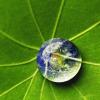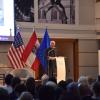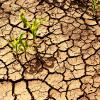
We need more basic sciences to achieve Agenda 2030 and its 17 Sustainable Development Goals (SDGs). This is the message sent to the world by the United Nations General Assembly on 2 December 2021 when Member States approved the resolution promulgating 2022 as the International Year of Basic Sciences for Sustainable Development (IYBSSD2022).
With resolution 76/A/L.12, the United Nations General Assembly ‘invites all [its] Member States, organizations of the United Nations system and other global, regional and sub-regional organizations, as well as other relevant stakeholders, including academia, civil society, international and national nongovernmental organizations, individuals, and the private sector, to observe and raise awareness of the importance of basic sciences for sustainable development in accordance with national priorities’.
The United Nations General Assembly motivated its decision with ‘the high value for humankind of basic sciences’, and with the fact that ‘enhanced global awareness of, and increased education in, the basic sciences, is vital to attain sustainable development and to improve the quality of life for people all over the world’. It also emphasized that ‘basic sciences and emerging technologies respond to the needs of humankind by providing access to information and increasing the health and wellbeing of individuals, communities, and societies’. Over the last two years, the successes and difficulties of the global fight against the COVID-19 pandemic have been a stark reminder of this importance of basic sciences, such as (but not limited to) biology, chemistry, physics, mathematics, and anthropology.
The vote is the result of the mobilization of the international scientific community, led since 2017 by the International Union of Pure and Applied Physics (IUPAP), CERN (The European Laboratory for Particle Physics), and 26 other international scientific unions and research organizations including IIASA, under the auspices of UNESCO. Over 90 national and international science academies, learned societies, scientific networks, research and education centers are also supporting this initiative. They will organize events and activities all over the planet during this special year to showcase and improve the links between basic sciences and the 17 SDGs.
“The promulgation of 2022 as the International Year of Basic Sciences for Sustainable Development comes at an opportune moment for IIASA, as we will also be celebrating the institute’s 50th anniversary and contributions to science in 2022. As IIASA is one of the consortium’s founding partners, we encourage all IIASA researchers, alumni, and colleagues they are collaborating with to create or join national IYBSSD 2022 committees to organize events and activities during this important year,” says IIASA Director General Albert van Jaarsveld.
The resolution was proposed to the United Nations General Assembly by Honduras, and cosponsored by 36 other countries. Its vote confirms resolution 40/C 76 adopted unanimously by the UNESCO General Conference on 25 November 2019.
The International Year of Basic Sciences for Sustainable Development (IYBSSD2022) will be officially inaugurated with an opening conference 30 June - 1 July 2022 at the UNESCO headquarters in Paris. Events and activities will be organized around the world until 30 June 2023.
Further information
International Year of Basic Sciences for Sustainable Development 2022 – https://www.iybssd2022.org
Member organizations of the Steering Committee of IYBSSD2022
International Union of Pure an Applied Physics
CERN (The European Laboratory for Particle Physics)
UNESCO’s Abdus Salam International Centre for Theoretical Physics, Italy
Chinese Academy of Sciences
European Gravity Observatory
European Physical Society
Fonds de recherche du Québec, Canada
Institut de recherche pour le développement, France
International Astronomical Union
Industrial Council for Industrial and Applied Mathematics
International geographical Union
International Institute for Applied Systems Analysis
International Mathematical Union
International Mineralogical Association
International Science Council
International Union for Vacuum Science, Technique and Application
International Union of Biological Sciences
International Union of Crystallography
International Union of Geodesy and Geophysics
International Union of History and Philosophy of Science and Technology
International Union of Material Research Societies
International Union of Pure and Applied Chemistry
Istituto Nazionale di Fisica Nucleare, Italy
Joint Institute for Nuclear Research, Russian Federation
Nuclear Physics European Collaboration Committee
Rencontres du Vietnam
Scientific Committee on Oceanic Research
Square Kilometer Array Observatory
Full list of countries who co-sponsored the resolution
Armenia, Azerbaijan, Bahrain, Bolivia, Brasil, Burkina Faso, Chad, Chile, Colombia, Cuba, Dominican
Republic, Ecuador, El Salvador, Fiji, Georgia, Guatemala, Honduras, India, Indonesia, Israel, Japan,
Jordan, Kyrgyzstan, Malawi, Nicaragua, Panama, Paraguay, Peru, Philippines, Qatar, Russian Federation,
Saudi Arabia, Serbia, Spain, South Africa, Thailand, Viet Nam
News

14 June 2024
IIASA Leadership visits Washington DC

05 June 2024
The 2024 State of CDR Report: Scaling up CO2 removal to meet Paris Targets

25 April 2024
